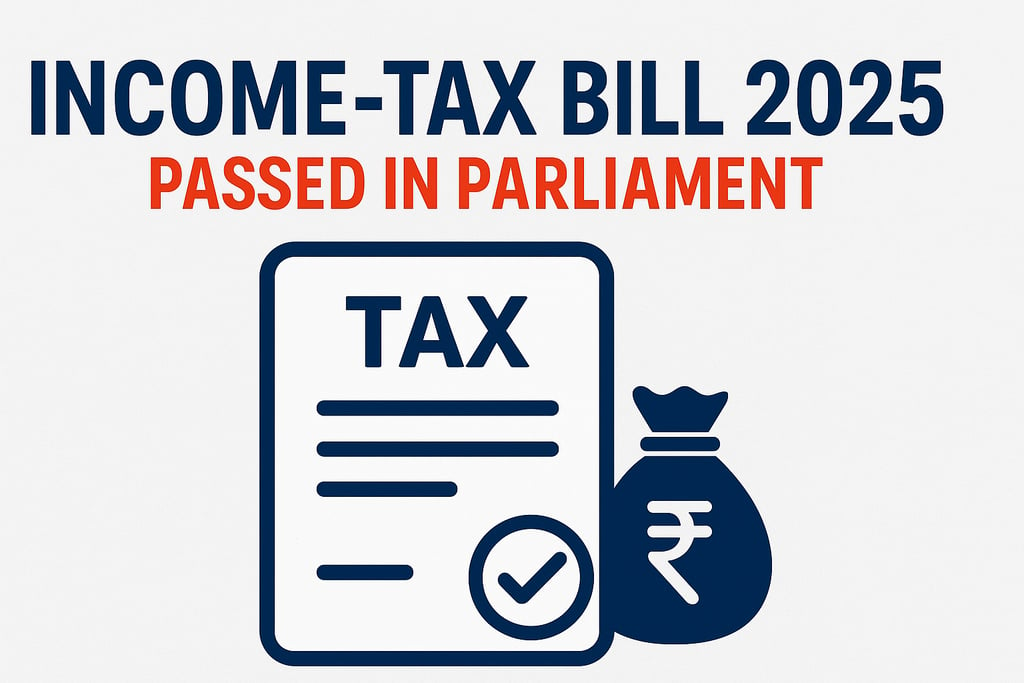Income-Tax Bill, 2025 – India’s Tax Revolution for a New Era
The Income-Tax Bill, 2025 — now passed in Parliament — marks India’s biggest tax reform in six decades. From zero tax up to ₹7 lakh income to simplified rules, faster refunds, and stricter action against evaders, here’s a clear and engaging breakdown of what it means for you.
Dr. Jayanta Kumar Roy
8/16/20254 min read


The wait is over. The Income-Tax Bill, 2025 — India’s most ambitious tax reform in over six decades — has officially been passed in Parliament. This historic legislation promises to transform how we pay taxes, how refunds are processed, and how evasion is tackled. For the honest taxpayer, it’s a breath of relief. For the evader, it’s a wake-up call.
In a country that’s now the fastest growing major economy and a global hub for technology, startups, and innovation, it was time to move from a tax system built for the 20th century to one designed for the 21st.
Why a New Bill Was Needed
Let’s be honest — the old tax law had become a jungle. Over the years, amendments, exceptions, and complex clauses piled up, making it harder for the average citizen to understand what they actually owed. It also created space for manipulation, where those with resources could navigate loopholes while small taxpayers struggled with compliance.
The Income-Tax Bill, 2025 addresses three major problems:
1. Complexity – It replaces over 500 convoluted provisions with a simpler structure.
2. Corruption – With faceless assessments and technology-driven scrutiny, human interference is minimised.
3. Inequity – It shifts the burden away from honest taxpayers and focuses on catching evaders.
What’s New in the Income-Tax Bill, 2025
1. Zero Tax Up to ₹7 Lakh Income
Perhaps the most widely appreciated reform is the increase in the basic exemption limit under the new tax regime. If your annual income is up to ₹7 lakh, you will owe zero tax after rebates. This is a direct benefit for the middle class and young professionals.
2. Deductions That Matter
The Bill retains and streamlines key deductions:
Home Loan Interest – Relief on interest payments under Sections 130–131.
Education Loans – Tax deductions under Section 129.
Health Insurance Premiums – Coverage for self, family, and dependent parents (Sec 126–128).
Electric Vehicle Purchases – An innovative green incentive under Section 132.
These benefits don’t just reduce tax liability; they encourage socially and economically beneficial behaviour — buying homes, investing in health, and supporting sustainable transport.
3. Simplified Capital Gains Tax
If you’ve ever sold property, shares, or even crypto, you know how confusing capital gains calculation can be. Sections 67–91 of the new Bill provide a simpler, more transparent method to compute gains and classify assets. This means fewer disputes and fewer opportunities for manipulation.
4. Cracking Down on Evasion
One of the most aggressive parts of the Bill is its anti-evasion measures:
GAAR (General Anti-Avoidance Rules) is now tighter, making it harder for companies to create artificial arrangements just to save tax.
Transfer Pricing Rules ensure multinational companies can’t shift profits to low-tax jurisdictions.
Scrutiny of Shell Companies and NGOs being used for money laundering.
In FY 2023 alone, tax authorities detected ₹1.9 lakh crore in undisclosed income. The Bill gives them sharper tools to tackle this without harassing genuine taxpayers.
5. Taxation of Non-Residents
For the first time, the law lays out clear, consistent rules for taxing foreign companies, NRIs, and investors. This promotes ease of doing business while protecting India’s revenue interests. India received $85 billion in FDI in 2023, and this clarity will help attract even more.
6. The Taxpayer Charter
This is a landmark addition. The Bill introduces a formal Taxpayer Charter (Section 240) — guaranteeing respect, fairness, and transparency in tax administration. It acknowledges that paying tax is not a punishment but a contribution to nation-building.
Technology at the Core
The Bill cements India’s shift to a digital-first tax administration:
Mandatory E-Filing for most taxpayers.
Faceless Assessments to reduce corruption and bias.
AI-Based Risk Profiling which operates under the Finance and Administration provisions of the new Income-Tax Bill, 2025 (replacing Sections 143 and 144 of the 1961 Act dealing with scrutiny/assessment)to flag high-risk cases while leaving compliant taxpayers in peace.
Already, 99% of returns are filed online, and this Bill makes the process even smoother.
How It Helps Different Sections of Society
For the Middle Class
No tax up to ₹7 lakh.
Deductions for home loans, insurance, and education.
Easier filing and faster refunds — within 30 days of filing.
For Businesses & Startups
Presumptive taxation for small businesses reduces paperwork.
Special incentives for startups in manufacturing, tech, and green energy.
Infrastructure and SEZ units get extended deductions.
For Rural India
Deductions for cooperatives and agri-tech investments.
Agricultural income remains exempt, but with tighter rules to prevent misuse.
The Opposition’s Concerns – And Why They Don’t Hold
Some have called the Bill “harsh” and “anti-people.” But let’s examine this:
If honest taxpayers get relief, how is it anti-people?
If evaders are caught, is that harsh — or just fair?
If rules are clearer, isn’t compliance easier for everyone?
The truth is, this Bill makes tax evasion harder, and that discomfort is being mistaken — perhaps deliberately — as oppression.
Why This Bill Matters for India’s Future
India is aiming to become a $5 trillion economy in the next few years. For that, we need:
1. Stable and predictable tax laws to attract investment.
2. A broad tax base to fund infrastructure and welfare.
3. Technology-driven transparency to win the trust of citizens.
The Income-Tax Bill, 2025, checks all three boxes.
A Fairer Social Contract
Taxes are not just about money — they are about trust. The government trusts that citizens will pay their fair share. Citizens trust that the government will use those taxes wisely.
This Bill strengthens that social contract by:
Removing harassment and ambiguity.
Rewarding compliance.
Ensuring the rich can’t dodge their obligations.
Final Thoughts
The Income-Tax Bill, 2025 is not perfect — no law ever is — but it is a giant leap forward. It is simpler, smarter, and more aligned with today’s India than the outdated act it replaces.
For the common citizen, it means:
Less paperwork.
More savings.
Faster refunds.
And the comfort of knowing that the tax system is finally on their side.
For the dishonest, it means:
More scrutiny.
Bigger penalties.
And fewer places to hide.
In short, it’s taxation with dignity for the honest and taxation with discipline for the evasive. And in a democracy like ours, that’s exactly how it should be.
